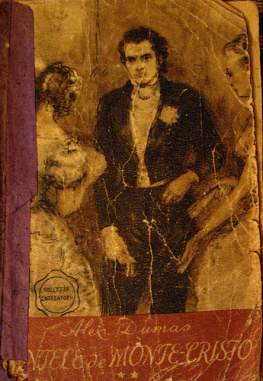I n the night of the 15th of January 1343, while the inhabitants of Naples lay wrapped in peaceful slumber, they were suddenly awakened by the bells of the three hundred churches that this thrice blessed capital contains. In the midst of the disturbance caused by so rude a call the first thought in the mind of all was that the town was on fire, or that the army of some enemy had mysteriously landed under cover of night and could put the citizens to the edge of the sword. But the doleful, intermittent sounds of all these fills, which disturbed the silence at regular and distant intervals, were an invitation to the faithful to pray for a passing soul, and it was soon evident that no disaster threatened the town, but that the king alone was in danger.
Indeed, it had been plain for several days past that the greatest uneasiness prevailed in Castel Nuovo; the officers of the crown were assembled regularly twice a day, and persons of importance, whose right it was to make their way into the kings apartments, came out evidently bowed down with grief. But although the kings death was regarded as a misfortune that nothing could avert, yet the whole town, on learning for certain of the approach of his last hour, was affected with a sincere grief, easily understood when one learns that the man about to die, after a reign of thirty-three years, eight months, and a few days, was Robert of Anjou, the most wise, just, and glorious king who had ever sat on the throne of Sicily. And so he carried with him to the tomb the eulogies and regrets of all his subjects.
Soldiers would speak with enthusiasm of the long wars he had waged with Frederic and Peter of Aragon, against Henry VII and Louis of Bavaria; and felt their hearts beat high, remembering the glories of campaigns in Lombardy and Tuscany; priests would gratefully extol his constant defence of the papacy against Ghibelline attacks, and the founding of convents, hospitals, and churches throughout his kingdom; in the world of letters he was regarded as the most learned king in Christendom; Petrarch, indeed, would receive the poets crown from no other hand, and had spent three consecutive days answering all the questions that Robert had deigned to ask him on every topic of human knowledge. The men of law, astonished by the wisdom of those laws which now enriched the Neapolitan code, had dubbed him the Solomon of their day; the nobles applauded him for protecting their ancient privileges, and the people were eloquent of his clemency, piety, and mildness. In a word, priests and soldiers, philosophers and poets, nobles and peasants, trembled when they thought that the government was to fall into the hands of a foreigner and of a young girl, recalling those words of Robert, who, as he followed in the funeral train of Charles, his only son, turned as he reached the threshold of the church and sobbingly exclaimed to his barons about him, This day the crown has fallen from my head: alas for me! alas for you!
Now that the bells were ringing for the dying moments of the good king, every mind was full of these prophetic words: women prayed fervently to God; men from all parts of the town bent their steps towards the royal palace to get the earliest and most authentic news, and after waiting some moments, passed in exchanging sad reflections, were obliged to return as they had come, since nothing that went on in the privacy of the family found its way outsidethe castle was plunged in complete darkness, the drawbridge was raised as usual, and the guards were at their post.
Yet if our readers care to be present at the death of the nephew of Saint Louis and the grandson of Charles of Anjou, we may conduct them into the chamber of the dying man. An alabaster lamp suspended from the ceiling serves to light the vast and sombre room, with walls draped in black velvet sewn with golden fleur-de-lys. Near the wall which faces the two entrance doors that at this moment are both shut close, there stands beneath a brocaded canopy an ebony bed, supported on four twisted columns carved with symbolic figures. The king, after a struggle with a violent paroxysm, has fallen swooning in the arms of his confessor and his doctor, who each hold one of his dying hands, feeling his pulse anxiously and exchanging looks of intelligence. At the foot of the bed stands a woman about fifty years of age, her hands clasped, her eyes raised to heaven, in an attitude of resigned grief: this woman is the queen, No tears dim her eyes: her sunken cheek has that waxen yellow tinge that one sees on the bodies of saints preserved by miracle. In her look is that mingling of calm and suffering that points to a soul at once tried by sorrow and imbued with religion. After the lapse of an hour, while no movement had disturbed the profound silence which reigned about the bed of death, the king trembled slightly; opened his eyes, and endeavoured feebly to raise his head. They thanking the physician and priest with a smile, who had both hastened to arrange his pillows, he begged the queen to come near, and told her in a low voice that he would speak with her a moment alone. The doctor and confessor retired, deeply bowing, and the king followed them with his eyes up to the moment when one of the doors closed behind them. He passed his hand across his brow, as though seeking to collect his thoughts, and rallying all his forces for the supreme effort, pronounced these words:
What I must say to you, Sancha, has no concern with those two good persons who were here a moment ago: their task is ended. One has done all for my body that human science could teach him, and all that has come of it is that my death is yet a little deferred; the other has now absolved me of all my sins, and assured me of Gods forgiveness, yet cannot keep from me those dread apparitions which in this terrible hour arise before me. Twice have you seen me battling with a superhuman horror. My brow has been bathed in sweat, my limbs rigid, my cries have been stifled by a hand of iron. Has God permitted the Evil Spirit to tempt me? Is this remorse in phantom shape? These two conflicts I have suffered have so subdued my strength that I can never endure a third. Listen then, my Sandra, for I have instructions to give you on which perhaps the safety of my soul depends.
My lord and my master, said the queen in the most gentle accents of submission, I am ready to listen to your orders; and should it be that God, in the hidden designs of His providence, has willed to call you to His glory while we are plunged in grief, your last wishes shall be fulfilled here on earth most scrupulously and exactly. But, she added, with all the solicitude of a timid soul, pray suffer me to sprinkle drops of holy water and banish the accursed one from this chamber, and let me offer up some part of that service of prayer that you composed in honour of your sainted brother to implore Gods protection in this hour when we can ill afford to lose it.
Then opening a richly bound book, she read with fervent devotion certain verses of the office that Robert had written in a very pure Latin for his brother Louis, Bishop of Toulouse, which was in use in the Church as late as the time of the Council of Trent.
Soothed by the charm of the prayers he had himself composed, the king was near forgetting the object of the interview he had so solemnly and eagerly demanded and letting himself lapse into a state of vague melancholy, he murmured in a subdued voice, Yes, yes, you are right; pray for me, for you too are a saint, and I am but a poor sinful man.





